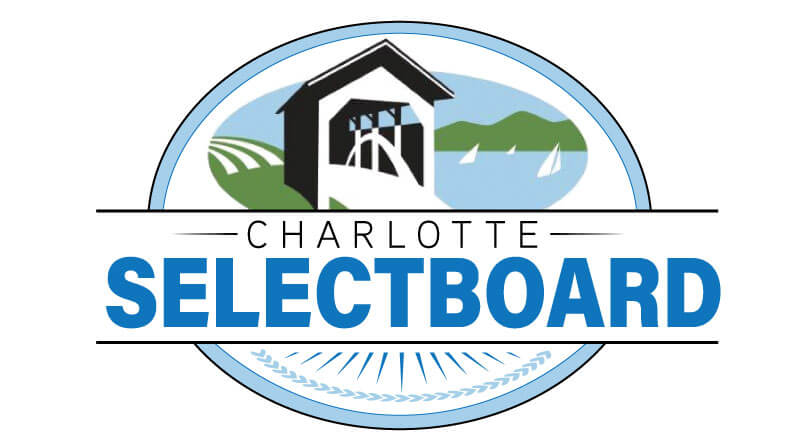Discussion between selectboard and fire and rescue service gets warm, fuzzy-ish
Charlotte is buzzing with the possibility of changing its fire and rescue service from a separate nonprofit organization into part of the town government.
A discussion about how public the planning for this proposed transition should be began contentiously at a special selectboard meeting on Monday, Aug. 15, but ended more collaboratively. By the end of the meeting, while not full-fledged warm and fuzzy, there were hints the relationship between the Charlotte Volunteer Fire and Rescue Services and the selectboard might be improving.
The meeting began with selectboard chair Jim Faulkner saying that going forward it was that board’s plan to have as much of the conversation in open session as possible, but this meeting would have to begin with a closed executive session to discuss a contract.
He said state statutes require closed executive sessions for some discussions.
 The agenda for the meeting only scheduled two one-hour executive sessions, but a group from the fire and rescue board of directors argued for holding the first hour, which was devoted to their meeting with the selectboard, in public.
The agenda for the meeting only scheduled two one-hour executive sessions, but a group from the fire and rescue board of directors argued for holding the first hour, which was devoted to their meeting with the selectboard, in public.
Members of the selectboard responded that the meeting needed to be closed for a discussion of a contract. Under Vermont statutes covering executive meetings, discussions of contracts are one of the allowed exemptions from open meeting requirements (1 V.S.A. § 313 a1A).
Members of the fire and rescue board questioned how the executive session could be justified to discuss a contract when the only contract that exists is the memorandum of agreement between the town and the fire and rescue service, and that document is public.
There may have been violations of the memorandum of agreement, selectboard member Matt Krasnow said, and added that the boards needed to discuss a possible pending legal issue.
According to 1 V.S.A. § 313 a1E, “pending or probable civil litigation or a prosecution, to which the public body is or may be a party” is another justification for holding an executive session.
Peter Richardson, a resident of Charlotte who was attending the meeting online, insisted that, just because an executive session was allowed, did not mean the selectboard was compelled to exclude the public.
“We can’t discuss why we need to go into executive session,” Krasnow said. “At this time, saying any more would be a breach of our responsibility of confidentiality.”
“We need to be working together to move forward to a municipal department,” Faulkner said.
And an overwhelming majority of the fire and rescue members in attendance spontaneously shouted in unison: “We agree.”
Faulkner said, if the town decides to move forward in changing the Charlotte Fire and Rescue Service from a nonprofit organization separate from the town to a municipal organization, the process will require multiple meetings, possibly every two weeks.
Ultimately, the two boards agreed to hold an executive session limited to five minutes and hold the rest of their conversation in open meeting, but that planned five-minute closed session lasted for almost 15 minutes. The rest of the first section of the selectboard meeting was conducted in public.
When the two boards returned to open meeting, a discussion ensued about how the transition would be complicated and time consuming, requiring expertise and time the members of the selectboard don’t have.
“The Charlotte Fire and Rescue Service has in place a municipal assistance committee, which is wonderful to have come to these meetings with the selectboard, to talk about what we need to do, the benchmarks to transition to the municipal service,” Krasnow said.
Although he and selectboard member Frank Tenney have been working with the municipal assistance committee, Krasnow said, the selectboard is thinking about hiring someone with the experience and knowledge to serve as a consultant to oversee the transition.
On the agenda, the second hour of the meeting was devoted to another executive session for a discussion with Rob Mullin about a contract. Mullin was demoted from deputy fire chief in September 2021, but continued to be employed by the fire and rescue department until March of this year when he was terminated.
This was the second executive session the selectboard has had with Mullin. Speculation by several members of the Charlotte Fire and Rescue Service, who declined to be identified by name, was that the selectboard was considering hiring Mullin as the consultant to manage the transition to a municipal department.
The second executive session of that night ended without the board making any motion or taking any action when it returned to open session.
But at the regular selectboard meeting last Monday, Aug. 22, a motion to send out a request for proposals for hiring a consultant to oversee the transition for no more than $30,000 passed by a 4-0 vote, with board member Lewis Mudge absent on vacation.
At 7 p.m. this coming Monday, Aug. 29, the selectboard will hold another special meeting about changing the fire and rescue service to a municipal department.

